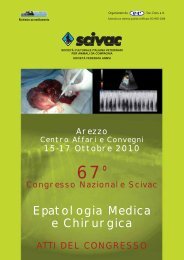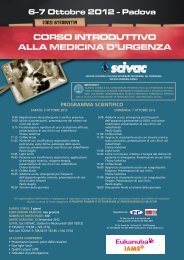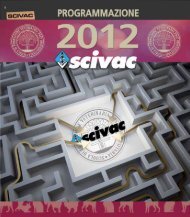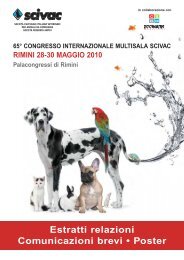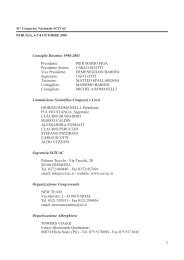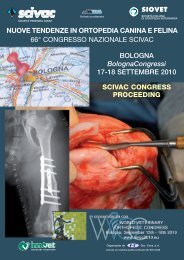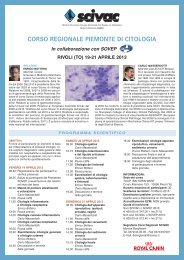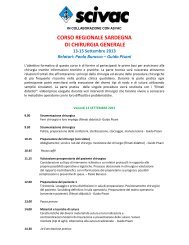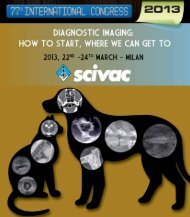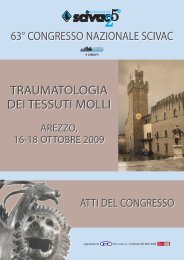58° Congresso Nazionale SCIVAC: Oncologia veterinaria
58° Congresso Nazionale SCIVAC: Oncologia veterinaria
58° Congresso Nazionale SCIVAC: Oncologia veterinaria
Create successful ePaper yourself
Turn your PDF publications into a flip-book with our unique Google optimized e-Paper software.
58° <strong>Congresso</strong> <strong>Nazionale</strong> <strong>SCIVAC</strong> • Milano, 7-9 Marzo 2008 • <strong>Oncologia</strong> <strong>veterinaria</strong> - Alle soglie del III Millennio<br />
SMALL MOLECULAR INHIBITOR THERAPY<br />
While a variety of pathways have been established as anticancer treatment<br />
targets, signaling molecules in the receptor tyroinse kinase class seem to be<br />
the closest to providing a window to clinical applicability. The promiscuous<br />
RTKI imatinib mesylate (Gleevec) has been used in cats and dogs with mast<br />
cell disease with some success. The dose in cats is 10 mg/kg daily, but remission<br />
in visceral mast cell disease may take several weeks to be detectable. In<br />
the dog, the dose used has ranged from 5 mg/kg to 10 mg/kg daily, with significant<br />
hepatobiliary toxicity noted in some instances. Until the underlying<br />
mechanism of this potentially lethal toxicity has been identified so that at risk<br />
cases can be screed, the drug should be used with extreme care and clear<br />
client informed consent of risk in canine patients. Investigational therapy with<br />
a different small molecular inhibitor of receptor tyrosine kinase signaling,<br />
(SU11654 - newly named Palladia by Pfizer), which acts as an inhibitor of c-<br />
KIT a variety of RTKs including c-Kit, PDGFR, and VEGF, has been carried<br />
out in the dog. Response has been seen in 11/22 dogs with MCT, as well as<br />
limited numbers of dogs with soft tissue sarcomas, mammary carcinomas,<br />
and multiple myelomas. The overall response rated noted with this drug was<br />
28% (16/57 dogs) and those dogs with a receptor mutation were the ones most<br />
likely to respond. However, this product is not yet commercially available and<br />
remains in trials.<br />
Other small molecular pathway inhibitors are under investigation in the<br />
dog, with studies ongoing both in vitro and in vivo. This field of research is<br />
experiencing an explosive development phase in human oncology, with many<br />
pathways and molecules being explored as potential treatment targets. A large<br />
additional effort in funded clinical trials, and time for outcomes assessment,<br />
will tell which of these agents will prove most effective, safe, and practical<br />
for use in veterinary medicine in the future.<br />
ANTITUMOR VACCINES<br />
Long-term survival of dogs with advanced malignant melanoma was<br />
achieved after DNA vaccination with xenogeneic human tyrosinase antigen,<br />
available under limited license in the United States from Meriel. In this phase<br />
one trial, median survival for 9 dogs treated was 389 days, with complete<br />
responses reported and greater that 588-day survival for one dog with bulky<br />
non-resectable disease. Dogs that demonstrated antigen specific antibody responses<br />
were more likely to have positive responses clinically. Gene therapy<br />
has also been employed experimentally in dogs with malignant melanoma. Intratumoral<br />
administration of DNA encoding bacterial superantigen of staphy-<br />
78



